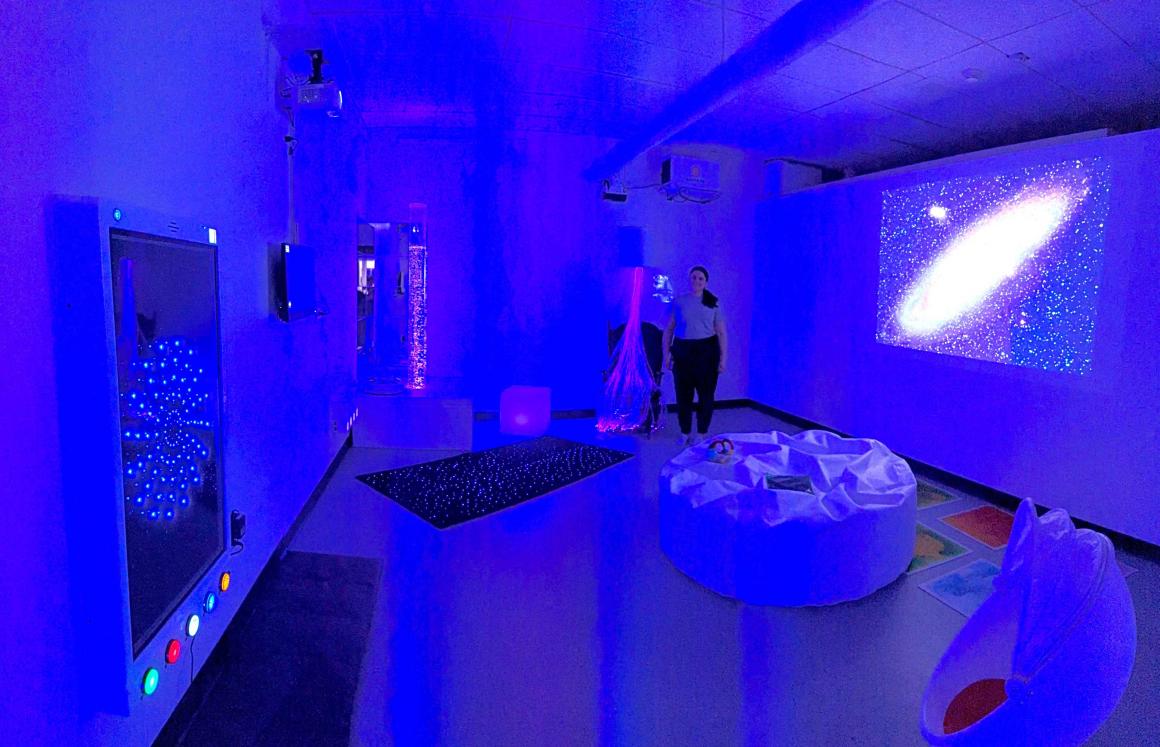Engineering Joy

By: Maisie O'Brien
Adults may not recall how important play was in their early years, but it is one of the primary ways we all learn and grow. With their sponge-like curiosity, children gain cognitive skills, social skills, and regulatory capacity from engaging in play activities.
As a pediatric occupational therapist, Tova Teperow, MS ‘15, is often working with children to grow their play skills. “If you’re working with a child who doesn’t have typical development, they might learn differently with play and you have to think creatively to make it accessible to them,” she says. “I really appreciate how Tufts instilled in me the importance of play – it’s one of pediatric OT’s main interventions.”
Teperow works at Perkins School for the Blind in Watertown, the nation’s oldest school for the blind and Helen Keller’s alma mater. She works with children ages 3-15 who have low to no vision and many have additional disabilities. “These kids don’t incrementally learn things just by seeing them the way typical kids do,” she says. “Many skills need to be explicitly taught in a multisensory capacity. It sparks creativity in an occupational therapist because you have to figure out how to make tasks accessible and understandable for a student who cannot see.”
Teperow always knew she wanted to work with children. She studied human development and family studies with a minor in special education at the University of Vermont. She was drawn to working with youth with special needs, but felt adrift when she realized she didn’t want to work as a teacher. Her path to occupational therapy became clear during a semester abroad in Denmark.
“As part of my program, I visited a multisensory room in Sweden called a “Snoezelen” where people with special needs and disabilities can relax and play,” she says. ”It had bubble tubes and ball pits, tactile and auditory devices, vibroacoustic therapy tools, and projections on the walls. It was so magical. The director of the Snoezelen was an OT and OTs are known for their expertise in sensory processing systems, so after seeing this I was set on a career in occupational therapy.”
As an OTD student at Tufts, Teperow loved her pediatric courses with Senior Lecturer Peggy Morris as well as her physical dysfunction courses with Distinguished Senior Lecturer Janet Brooks. She completed fieldwork placements at an elder care facility and a pediatric clinic focused on sensory integration.
“My time at Tufts was a wonderful learning and bonding experience,” she says. “I met some of my best friends in this program. I loved how we were in this bubble of classes and fieldwork. Although you never feel fully prepared to go out into the field and work with clients for the first time, we gained the clinical reasoning skills to be effective entry-level OTs.”
After graduating from Tufts, Teperow worked at an early intervention agency before joining Perkins. A lifelong crafter and builder, she was always devising creative tools and games for her students to learn and play with. In 2022, she enrolled in the three-course Certificate in Assistive Technology to gain foundational knowledge in assistive technology and expand her maker skills.
“It was so fun to return to Tufts and take courses with both human factors engineering and occupational therapy students,” she says. “My classmates were excited to hear about my experiences in the field and how I could apply what we were learning to my work with children.” As part of her final project for the certificate, Teperow worked with Lecturer and Coordinator of the Assistive Technology Program Jennifer Buxton to create a button-powered pouring device for children with motor impairments to use for prevocational activities and cooking at Perkins.
This fall, Teperow unveiled a passion project years in the making: a Snoezelen room in the Perkins’ basement, complete with a bubble tube, fiber optics, rocking chairs, bean bags, an aromatherapy panel, and dream-like wall projections. “When you go in there, it’s just so cool,” she says. “It’s like you’re a kid again.” The space offers a respite where children can explore, relax, and play; and it can be customized for each child’s specific needs.
“For many of our kids, progress can be slow,” she says. “But when you see progress, it is so impactful and the families are so excited. For a child to go from not using their sight at all to developing the ability to look in the direction of something, reach out, and grab it – that’s a huge deal and it’s what motivates me.”
Outside of her occupational therapy work, Teperow loves dancing, woodworking, and being a mom to a two-year-old boy. “It’s so much fun to watch him grow and develop, and see the world through his eyes,” she says.
Teperow pictured inside the Snoezelen multi-sensory room she founded at the Perkins School for the Blind.
